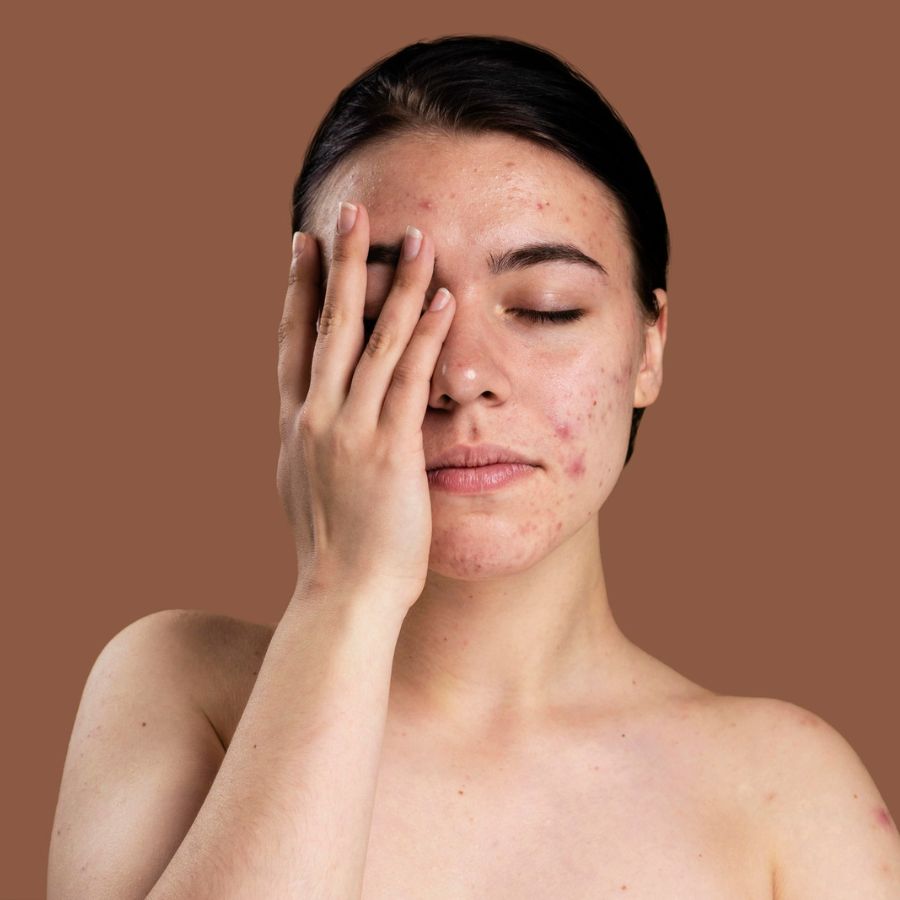News
The Hidden Reasons For Your Skin Damage

Damaged skin has many causes, and removing them speeds up recovery. Environmental pollutants, skin care product ingredients, and other reasons can make it hard. Identifying a source is challenging. Rinsing your hair with cold water after a day in the sun helps restore its natural moisture.
We've created this quick reference list to help you identify the primary cause of damaged skin. Once you know what's wrong, finding a solution is more manageable. Let's learn.
Secret Causes of Your Skin Problems
A few main things that cause the skin to get worse include:
-
Chemicals Hidden In Products

Of the almost 3000 chemicals used in cosmetics today, it is estimated that just 10% have undergone safety testing. In 2016, the FDA received around 1600 reports of adverse events due to the absence of regulation. Common things damage more than four individuals per day.
These environmental toxins damage the skin in several ways, including inflammation, stripping of natural oils, and a shift in the skin's pH. In addition, some chemicals release formaldehyde, which has been related to detrimental health effects such as skin rashes, chronic weariness, and vertigo.
Other toxins in skin care products have been shown to accumulate in the brain and other organs, compromising their function. Some of these substances are known hormone disruptors, some are tumor promoters, and still, others are cancer-causing themselves.
Avoid these: sulfates, mineral oil, benzoyl peroxide, dea & tea, dimethicone, dioxin, parabens, propylene glycol, urea, artificial colors, and fragrances.
-
Certain Trigger Diet

A common saying is, "Food is medicine." If this is the case, it also suggests that some foods may be harmful. Since every outward symptom—including skin eruptions—indicates an interior disease, diet is one of the seven primary causes of damaged skin.
Since inflammation is at the root of some of the worst skin conditions, diets high in pro-inflammatory omega-6s are likely to be to blame. Moreover, sugar causes rapid aging of the skin by binding to collagen molecules and neutralizing their anti-aging effects. It also promotes oil production, which clogs pores.
Genetically modified organisms (GMOs) and extra hormones contribute to skin damage by interfering with our natural hormones. In addition, because phytoestrogen-containing foods mimic the effects of estrogen, they pose a health risk.
Therefore, here are the most undesirable foods to avoid like sugary foods, protein substitutes made from soy-based processed food, food that is high in fat and grease (trans fats), and other foodstuffs like processed oils from plants, gluten & alcohol.
Also Read: 10 Best Goodbye-Age Ingredients
-
Allergies

Itchy skin can be caused by several factors, including recognized or unknown allergies. The root of a skin rash can determine what we call it. For starters, there's urticaria, which arises from the release of histamine by activated mast cells. So, these sudden red, itchy spots are caused by histamine reactions.
Dermatitis is classified into atopic dermatitis, eczema, and contact dermatitis. The most frequent causes are
- An allergen
- Certain medicines
- Chemical triggers products
- Insects bite
- Perfumes and dyes
- pet dander
- pollen
- Specific Groceries
- Temperature
-
PH Levels

It is recommended that anyone with damaged skin first check their skin's PH level, which should be around 5.5. The acid mantle is a slightly acidic barrier that keeps germs, diseases, and environmental toxins from getting into your skin.
If the skin's PH barrier is broken, symptoms like acne, dermatitis, and flushing could appear. Chronically dry skin is too alkaline, while oily skin is too acidic. Skincare products, detergents, and soaps that are not pH balanced can be particularly damaging because they can have a PH value as high as 10 (highly alkaline).
Also Read:
-
Household Products

Your skin is like a sponge; it will soak up anything it comes in contact with. A recent study found that the average person consumes 5 pounds of pollutants daily.
These chemicals, from surfactants and volatile organic compounds to known carcinogens and harmful preservatives, play a role in skin damage.
Laundry detergent, for example, damages the skin's acid layer and causes a change in the skin's pH. Another study found that at least one chemical on the FDA's list of potentially dangerous substances was in dozens of ordinary detergents.
However, other products, especially foaming ones, have been shown to irritate the skin, cause dryness, and even break down the skin's protective barrier. Natural remedies can help you avoid skin damage caused by rinse aids for the dishwasher, cleaning products like laundry detergent, soaps, fragrances in the makeup, etc.
-
Hormones

Acne and other skin issues have long been linked to hormones, particularly estrogen, and androgen (male sex hormones like testosterone). When these hormones are elevated, more oil is produced.
Estrogen fluctuations have been linked to severe skin changes such as sudden dryness and discoloration. Additional factors include thyroid hormones. While a hyperactive and hypoactive thyroid can induce redness, this can also lead to rough, dry skin. Also, when cortisol increases, oil production and inflammation increase, which are the leading causes of many skin conditions that itch.
-
Overall Wellness Due To Gut Microbiome

Research shows that the intestines and skin are linked. You may have heard the phrase, "Your gut health is a reflection of your overall health." However, scientists increasingly believe the gut affects skin health.
Your skin, like your gut, also contains a microbiome. Unfortunately, external chemicals and products, particularly antibacterial ones with triclosan (found in many cleaning agents), can easily upset the delicate balance of microorganisms.
Vitamin C, collagen, and zinc deficiencies also cause skin problems. Other lifestyle factors, such as sun exposure, contribute to skin damage caused by free radicals. Exercise can enhance skin health by increasing oxygen and blood flow to skin cells, regardless of how often you work out. However, the advantages will only be recovered if you exercise regularly.
The Takeaway

YourHappy Collagen (Advanced)
Key Benefits
- Youthful, Smooth & Supple Skin
- Reduced Wrinkles and Fine Lines
- Increased Firmness & Elasticity
- Deeply Hydrated Skin, For a Rested & Refreshed look
- Reduced Under Eye Dark Circles, Acne, Blemishes & Pigmentation
These causes mentioned above apply to all damaged skin. Take some time today to evaluate your skin's health and any lifestyle factors contributing to its decline. Start with your skin's pH. Then, continue with food, hidden poisons, household items, allergy triggers, etc.
After your evaluation, you should understand what's causing your skin distress and be able to create a plan to cure it. Also, to maintain collagen levels, add on Collagen Naked daily.
FAQ
Does the skin ever recover completely from hidden toxins?
The depth of a wound determines how well it heals. Most wounds heal because they don't penetrate all skin layers. As a result, the skin cannot recover normally after chemical injuries.
What is the most damaging to the skin?
Many people get the most solar damage. Sunlight inhibits collagen production and skin suppleness. These two cause wrinkles over time. As a result, taking Collagen Powder daily is essential for keeping collagen levels consistent.
Can damaged skin be restored?
Skin may heal even after severe damage because of stem cells in the dermis and cells in the epidermis stratum Basale, which can generate new tissue.
What causes skin damage?
Skin damage can be caused by a variety of factors, including exposure to UV radiation, environmental pollutants, harsh chemicals, poor nutrition, and aging.
What are some common signs of skin damage?
Some common signs of skin damage include sunburn, dryness, itching, flaking, discoloration, wrinkles, and fine lines.
How can I prevent skin damage?
You can prevent skin damage by wearing protective clothing and sunscreen when outdoors, avoiding tanning beds, staying hydrated, eating a healthy diet rich in antioxidants, and avoiding exposure to environmental pollutants and harsh chemicals.
What are some treatments for skin damage?
Treatments for skin damage depend on the severity and cause of the damage. Some treatments include topical creams, chemical peels, laser therapy, and cosmetic procedures like Botox or dermal fillers.
Read More Articles Collections:
New Skin Routine Today | Enhance Skin Elasticity | Toxic Ingredients In Skincare | Skin's Natural Hydration | The Benefits Of Marine Collagen | Uneven Skin Tone? | Collagen Masks Fail? | Skincare Routine pH Of 5.5 | Collagen Powder For Gut Health | Immune System Health And Aging | Skincare For Unlimited Beauty Benefits | Enhance Your "Glow" Skin Health | 10 Best Goodbye-Age Ingredients





































